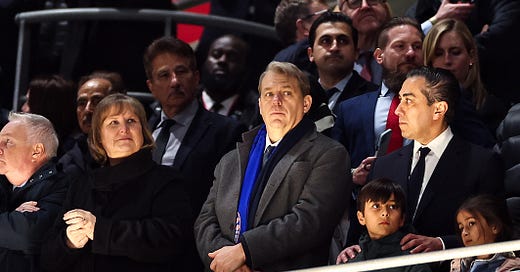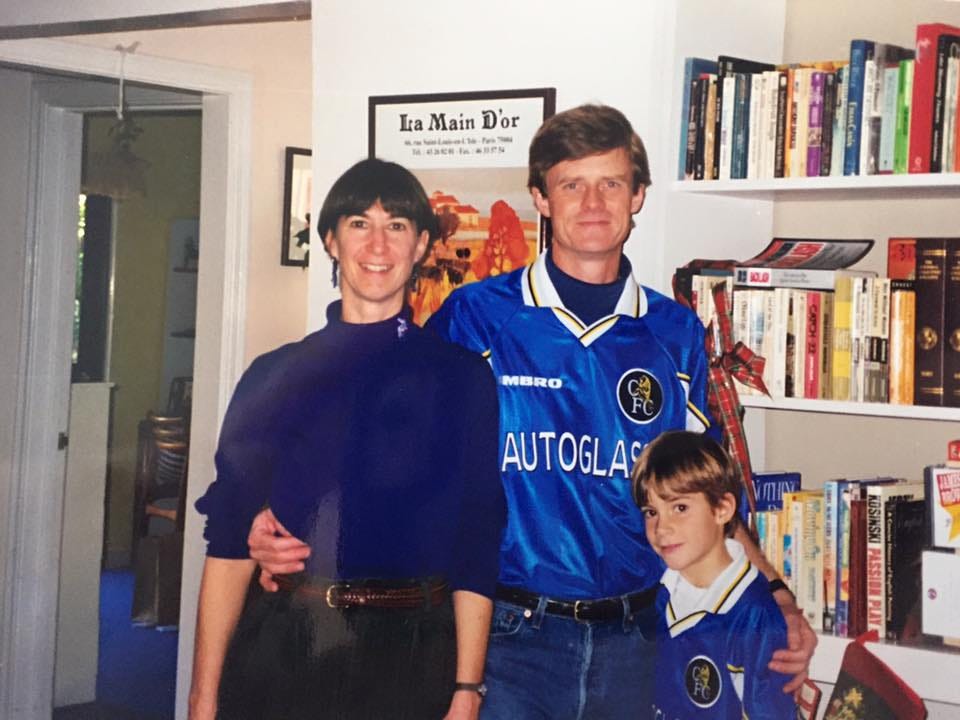
Private Equity is Ruining My Weekends
An American investment firm is running my beloved Chelsea Football Club into the ground.
The man in the center of the photo at the top of this blog is named Todd Boehly. Todd Boehly is, to keep things simple, a Private Equity Demon, whose particular area of interest these days is sports. Through various companies and partnerships, Boehly owns (at least in part): the Dodgers, the Lakers, the WNBA’s LA Sparks, and, to my eternal dismay, the English Premier League’s Chelsea Football Club.
Through an accident of birth and a self-admitted perversion of spirit, I am a fan of Chelsea Football Club. I love Chelsea Football Club. I have been a fan of Chelsea Football Club since I was a very tiny child. Here:
While my general interest in professional sports has waxed and waned over the subsequent 30 years, I find myself now, at the age of almost 34, to be emotionally invested on a distressing level in the actions of a group of young men a decade younger than I am. Every weekend, and sometimes during the week, I send a dozen or more frenetic WhatsApp messages in a group chat called Chelseaidiots, which is made up of me, my father, and my auntie Chris, while simultaneously texting several other friends who have the same affliction. Often, as well, I am yelling at the television. My wife tolerates this, grudgingly, but the cat does not (he goes to another room).
The reason for the yelling, over the past few years at least, has been that Chelsea Football Club are very bad. Chelsea have historically been one of the better teams in English football, though not as dominant as say, Manchester United, and one of their best periods of play coincided neatly with my adolescence and young adulthood. This was thanks to Russian billionaire Roman Abramovich, who used dirty money obtained in the capitalist free-for-all following the breakup of the Soviet Union to buy a ton of good players and hire some of the best managers in the sport and win a bunch of trophies. It rocked. (What? Like the owners of your favorite sports team aren’t problematic? Shut up.)
In 2022, however, Russia invaded Ukraine, and suddenly Abramovich’s dirty money was a little bit too dirty, even by the standards of international football, which famously held its last World Cup in Qatar, where the theocratic monarchs in charge worked slaves to death in order to build massive stadiums and fan villages that are now sparsely used. Anyway. Abramovich was forced to sell the club, which is where The Scoundrel Todd comes in.
In the interest of keeping this blog somewhat concise, I’m going to gloss over a lot of stuff here and generalize wildly as to Boehly’s actions while owner of the club. For those who don’t know, club football in the major European leagues operates under a ludicrously complicated web of financial rules—very few of which I fully understand, but which are, fortunately, largely immaterial to the point I want to make in this blog. What you need to know is that the owners of a club spend money to “buy” players from other teams, and receive money from selling players, tickets, merch, and playing in certain competitions. In money terms, you can think of players a little bit like stocks: you want to buy them low, have them perform well, and then eventually either sell them for more money than you got them for (after they’ve proved that they’re good at soccer by winning stuff for you), or keep them around because the stuff that they’ve won makes you money too.
This decision-making process is usually a collaboration between the team’s ownership, executive suite, and the manager, who is the one who has to actually coach the players, put them in their positions, and decide when to sub them on or off the field. But the Boehly-era strategy has been clear: buy young, promising players. Lots of them. I mean lots of them. This is, unsurprisingly, a very private equity demon thing to do: these young players, some of them literal teenagers, are basically akin to crypto or some other highly volatile investment: they could become superstars, or do basically nothing and go bust. The Boehly strategy has largely eschewed the “mutual funds” of the professional soccer world, ditching aging players with proven track records of success in favor of bright young things who might be good in a few years, and then throwing them in with a succession of hired and fired coaches who don’t fully know what to do with them or how to make them win games. This has led, like most things that private equity does, to a whole lot of misery and losing, even though the club spent a staggering one billion dollars on new talent.
And yet! In the waning days of this year’s premier league season, Chelsea had finally gotten their team of 24-year-old potential-filled but experience-wanting youngsters into something resembling a good soccer team. They had shot up from a dismal 12th place in the league to an almost-respectable sixth. Their manager, veteran Argentinian Mauricio Pochettino, had reached something approaching competency (I am not a fan of his, but he was starting to get somewhere). We were winning soccer games! The players were playing well!
And now, via NBC Sports:
Mauricio Pochettino is out as Chelsea manager after just one season, with the sides mutually agreeing to part ways on Tuesday, barely 48 hours after the conclusion of the 2023-24 Premier League season.
Fuck! What da hell! Fuck!
There is a wild amount of speculation as to why this happened, namely because “mutually agreeing to part ways” means about as much in a managerial decision as it does in a romantic relationship: someone’s always getting dumped. Smarter and more knowledgeable people than I have figured it out, mostly. Per The Athletic:
The Athletic has spoken to a range of people familiar with the situation, granting them anonymity to protect relationships and to ensure this article retains a comprehensive balance. Some of the key points of contention those conversations revealed centred on:
The head coach’s willingness to fit in with the club-imposed structure
Initial scepticism over the £221.7m ($282m) midfield pairing of Moises Caicedo and Enzo Fernandez
The owners’ desire for a coach who ‘teaches’ football
Training methods and the club’s injury record
Pochettino’s sense that he was one of the few experienced operators in the building
When you translate some of this, you start to see the Private Equity of it all. Poch was given top-down instruction from the owners that he didn’t like. The owners then criticized his methods of doing the job they’d hired him to do. The owners spent money on stuff and players that Poch didn’t ask for. This contributed to Poch’s own sense that the “Adults in the Room,” perhaps, did not actually know what the fuck they were doing. So he bounced, or they fired him, or who knows. But he’s gone. And Chelsea’s hard-won and very brief success may be going with him.
Because as we know, when Private Equity Demons force reasonable people out of their jobs, the wheels start to fall off. Or get stripped off.
The distressing thing about all this is that one of the best ways to raise money as a football club is by selling off what are known as “homegrown” players — kids, essentially, who have come through the club’s academy system and eventually become first-team pros themselves. Every club does this, and Chelsea have one of the best academies in Europe. But the problem with this is that sometimes the fans, and the coaches, and the rest of the team really, really want to keep those players around. These are kids — like, say, acting Chelsea captain Conor Gallagher — who have devoted their life’s work to the club.
Sports are one of the only semi-healthy ways that modern society lets human beings indulge in outright tribalism, and let’s just say that having a propa’ Chelsea boy like Gallagher or (frequently injured but no less beloved captain) Reece James in the squad is one of the things that makes me feel good on a week by week basis. We love our Big Football Boys. And yet: Boehly wants to sell them because it would make him money. Private equity cares naught for emotion or feeling or even what it is to be a “team.”
If it’s possible to mathematically win just enough games that the team is a return on investment, or to buy enough success that everyone shuts up about the brutal backroom dealings that squeeze beloved players out, they’re going to do it. And in the meantime, they’re all so convinced that they’re the only rich smart ones in the room that they’ll blame every failure on someone down the chain. You’ve heard this story before. Most of you have lived it. I certainly have, but I wish I didn’t have to be reminded of it every time Chelsea goes down two-nil to fucking Brentford.













Private Equity is ruining not only sports, but also the real estate market, health care, the Hollywood movie industry, apartments and rentals, live shows and the tickets to those shows, the music industry, the US government and much much more...
"(What? Like the owners of your favorite sports team aren’t problematic? Shut up.)"
I grew up halfway between Baltimore and D.C., rooting for the Orioles, WFTs, Bullets/Wizards, and Capitals. You don't have to convince me about problematic sports owners.